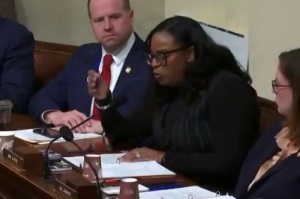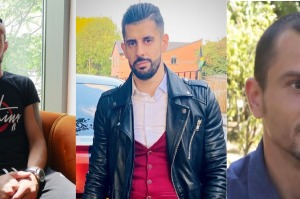Afghanistan's first female mayor says Taliban is waging 'genocide' against minority group

A woman who served as the first female mayor in Afghanistan is urging the U.S. government to declare the Taliban's treatment of the Hazara ethnic group a genocide as the first anniversary of the withdrawal of U.S. troops from the Central Asian country approaches.
Azra Jafari, who formerly served as mayor of Nili in Afghanistan's Daykundi province, was one of several speakers to address the annual International Religious Freedom Summit in Washington, D.C., late last month.
Jafari was appointed the first female mayor in Afghanistan in 2008 and held the post until 2014. She has become a vocal advocate for women's rights and a staunch critic of the control the Taliban has taken since the U.S. military's withdrawal from the country last year.
In an interview with The Christian Post, she shared concerns about religious freedom in Afghanistan and the threats to women and minorities in the country.
Nearly a year after the Taliban took control of Afghanistan, Jafari says the situation on the ground has turned bleak for women and her Hazara ethnic group.
Hazaras are a predominantly Shia Muslim ethnic group of over 3.5 million that primarily reside in central Afghanistan. The ethnic group has long been subject to violence at the hand of state actors and militant groups and is considered by some to be historically the most discriminated against ethnic group in Afghanistan.
As violence against the minority group has escalated in the past year, she said: "the Taliban [is] trying to ban the internet" to prevent journalists from covering incidents in the country.
Jafari stated that the Taliban has engaged in a deliberate campaign to "kill and then displace" members of the ethnic group from their homes which has led to the displacement of more than 1,400 families.
Reports have surfaced in the past year of massacres targeting Hazara people, including the killing of 13 Hazaras in the Daykundi province. Reports have also emerged of evictions of thousands of Hazara families from their homes in the Daykundi province and Mazar-e-Sharif based on claims they had no ownership over their land.
The Taliban look for the "smallest cues" to determine whether someone is part of the Hazara ethnic group or not, she said. This includes looking at their face or learning their name. Jafari reported that once the Taliban determines that someone is a Hazara, "they kill you right away."
"This is like a genocide against Hazaras," she said.
Jafari maintained that "the international community is silent and they cannot do anything with this situation right now" because of the Taliban's effort to take control of the internet.
Jafari hopes that her appearance at the International Religious Freedom Summit would raise awareness about the plight of the Hazaras.
"I want to ask for the U.S. government to take action … for the protection of Hazara minorities in Afghanistan because really it is genocide," she proclaimed.
While Jafari dates the beginning of the genocide against Hazaras to more than a century ago, she sees now as the time to "protect the Hazara community from Afghanistan" and wants the U.S. to "recognize what happened [to the] Hazara ethnicity in Afghanistan as a genocide."
Jafari, a Shia Muslim, insisted that the Taliban, a Sunni nationalist movement, does not believe in "rights for minorities or other religions in Afghanistan." From their perspective, she maintained, Sunni Islam should be the only religion practiced in the country.
Since retaking power, Jafari declared, the Taliban has "started exactly the same model of governance" they embraced when they last ruled Afghanistan before the 9/11 terror attacks in 2001 and the subsequent U.S. military involvement in the nation.
"This is not acceptable for not only women, it is not acceptable for anybody, especially for the religious minorities."
Although the Taliban is "trying to act like they are changed" and accept "all religions or every people that live in Afghanistan," Jafari sees such pronouncements as insincere.
She highlighted the Taliban's refusal to honor Afghanistan's constitution that essentially declares that "everybody is the same," whether male or female or Sunni or Shia. The Taliban has also "closed the last worship place" for Hindus in Afghanistan and prevented religious minorities from holding "special events in the streets."
Jafari characterized reports of violence between the Islamic State and the Taliban as "fake news" designed to distract "international communities" and the media from the "other big issues" in Afghanistan, specifically the violence against the Hazaras. She acknowledged that there may be a "small conflict" between the two groups and predicted they could "solve it very easily."
Jafari elaborated on the oppression of women and other ethnic minorities at the hands of the Taliban, stating that they are banning women from "society," "politics" and the "economy."
"All women are in the house and then they can't do anything," she said.
She reported that "women cannot go to school and don't have any right to do any jobs like as a judge or in [a] high-ranking position."
Jafari identified elementary school teachers and hospital employees as among the only jobs open to women following the Taliban takeover.
For her part, Jafari is free from the Taliban-controlled Afghanistan, as she has resided in Maryland since 2014. The Taliban's threat against her prompted her to escape to the U.S.
As a teenager and young adult, Jafari had previously spent time as a refugee in Iran, where she opened a school for other refugees who could not go to school because they lacked the proper identification from the United Nations High Commissioner on Refugees. She started the school when she was 17 years old and worked there for almost six years.
Jafari returned to Afghanistan shortly after the 9/11 attacks. While her school operated without permission from the Iranian government as an "underground school," it educated over 8,000 students. Her friends took control of the school after she returned to Afghanistan for about one year before the government closed the school because it was illegal.
Jafari expressed gratitude that many children who went to the "underground school" ended up continuing their education and obtaining college degrees at institutions worldwide.
Ryan Foley is a reporter for The Christian Post. He can be reached at: ryan.foley@christianpost.com



























